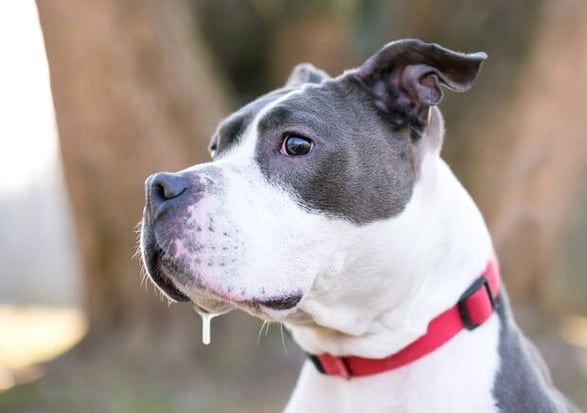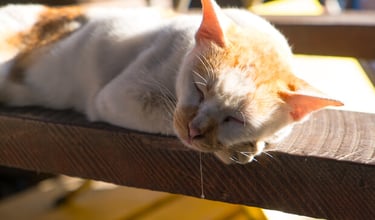Why Is My Dog Drooling? 8 Common Reasons

Table of Contents
As a licensed veterinarian with over 16 years of experience running a veterinary practice, I cannot count how many times I've been asked "Why is my dog drooling?" by my clients.
Here's what I typically tell dog owners when asked about drooling:
Drooling, medically referred to as ptyalism, is a common behavior in dogs. While it's often seen as normal, especially in specific breeds or during certain activities, there are various reasons behind it.
These are the most common reasons for drooling in dogs:
1. Breed Traits
Certain dog breeds, especially those with loose, floppy lips like Saint Bernards and Bulldogs, naturally drool more than others. This is simply due to their mouth structure, which is completely normal.
2. Heat and Exercise
Dogs can drool more when they are hot or have been exercising. Drooling helps them cool down, much like how humans sweat.
Related article: 11 Ways to Cool Dogs Down During the Summer
3. Excitement and Anticipation
Like humans, dogs can salivate more when they see tasty food or even when they're just excited. You'll often see this behavior around dinner time or when they're anticipating a treat.
4. Nausea or Car Sickness
Drooling can be a sign of nausea in dogs, similar to humans. This often happens during car rides if the dog is not used to them or gets motion sickness.
5. Dental and Oral Problems
Oral health problems such as gum disease, tooth decay, or oral injuries can cause excessive drooling in dogs. You might also notice other signs like bad breath, difficulty eating, or pawing at the mouth.
📒 Note: If you suspect your cat has dental or oral problems, schedule a veterinary dental consultation.
6. Foreign Objects
If a dog has a foreign object caught in its teeth or throat, it may drool excessively. They might also show signs of discomfort, like pawing at their mouth or difficulty swallowing.
7. Heat Stroke
During extremely hot weather, dogs might drool excessively due to heat stroke. This is a serious condition that can also cause panting, lethargy, an increased heart rate.
8. Illness or Toxins
Certain illnesses or exposure to toxins can cause dogs to drool excessively. These can include kidney disease, liver disease, certain types of cancer, or ingestion of toxic plants or chemicals. These conditions are serious and require immediate veterinary attention.
When to Consult a Vet
It's natural for dogs to drool occasionally. However, if you notice a sudden increase in drooling, if it persists for an extended time, or if it's accompanied by signs of discomfort or illness like loss of appetite, behavioral changes, or difficulty swallowing, it's wise to consult your veterinarian.
Other red flags include drooling that only occurs on one side of the mouth, drool that has an unusual color or consistency, a bad odor, or if drooling is associated with potential exposure to toxins.
Your veterinarian is invaluable in ruling out any medical issues and managing your dog's drooling effectively. Remember, it's always better to be safe than sorry when it comes to your pup's health.
Should My Pet Be Seen by a Veterinarian?
1. Have you noticed changes in your pet’s appetite?
2. Does your pet have diarrhea or loose stools?
3. Have you noticed changes in your pet’s thirst/water consumption?
4. Is your pet having accidents in the house?
5. Is your pet pacing and unable to settle?
6. Is your pet panting more than usual?
7. Is your pet whining or vocalizing more than usual?
8. Is your pet shaking more than usual?
9. Is your pet hiding or avoiding physical contact more than usual?
10. Is your pet more lethargic and sleeping more than usual?
11. Are you concerned about changes in your pet’s behavior?
12. Is your pet scratching their ears?
13. Is your pet licking their paws more than usual?
14. Does your pet have a rash?
15. Is your pet moving more slowly than usual or having a harder time getting up or down?
View Results
Should My Pet Be Seen by a Veterinarian?
1. Have you noticed changes in your pet’s appetite?
2. Does your pet have diarrhea or loose stools?
3. Have you noticed changes in your pet’s thirst/water consumption?
4. Is your pet having accidents in the house?
5. Is your pet pacing and unable to settle?
6. Is your pet panting more than usual?
7. Is your pet whining or vocalizing more than usual?
8. Is your pet shaking more than usual?
9. Is your pet hiding or avoiding physical contact more than usual?
10. Is your pet more lethargic and sleeping more than usual?
11. Are you concerned about changes in your pet’s behavior?
12. Is your pet scratching their ears?
13. Is your pet licking their paws more than usual?
14. Does your pet have a rash?
15. Is your pet moving more slowly than usual or having a harder time getting up or down?
Share Quiz
Conclusion
As we covered, there are a variety of reasons for drooling in dogs. Some are more severe than others. Though occasional drooling is typical, if it becomes consistent or excessive, it could signal a need to visit your veterinarian.
Luckily, with BetterVet, pet parents no longer need to get their slobbery pup in the car and drive to a traditional brick-and-mortar veterinary clinic. We can provide the same quality veterinary care right in the comfort of your home.
Book an in-home vet visit with our licensed Fear Free® mobile veterinarians today!
Hassle-free In-Home Pet Sick Visits
When your pet isn't feeling well, the last thing you want is a stressful trip to the vet. Our in-home sick pet visits offer a calm, stress-free alternative.
Frequently Asked Questions
Why would a dog start drooling all of a sudden?
Sudden drooling in dogs could be due to various reasons, such as anxiety, the presence of a foreign object in their mouth, dental issues, or exposure to certain toxins. Always consult a veterinarian if you notice a sudden change in your dog's drooling habits.
When should I be concerned about my dog drooling?
You should be concerned about your dog's drooling if it is excessive, persistent, or accompanied by other signs of distress, such as difficulty eating, changes in behavior, or signs of pain. Any sudden change in your dog's drooling pattern warrants a veterinarian consultation.
Why is my dog drooling and lethargic?
If your dog is drooling and lethargic, it could be a sign of a serious health issue such as heat stroke, poisoning, or an underlying illness. This combination of symptoms should be evaluated by a veterinarian immediately.
Can allergies cause drooling in dogs?
Yes, allergies can cause drooling in dogs. If your dog is allergic to a certain food, substance, or plant, their mouth or throat might become irritated, leading to increased drooling. It's important to consult your veterinarian if you suspect your dog has an allergy.
Do dogs drool a lot when in pain?
Yes, dogs can drool more than usual when they're in pain, especially if the discomfort is in the mouth or stomach area. If your dog is drooling excessively and you suspect they might be in pain, it's important to seek veterinary care promptly.
Sources and References
-
Kook, P. H. (2013). Ptyalism in dogs and cats-a short review.
-
Baker, M. A. (1984). Thermoregulatory responses to exercise in dehydrated dogs. Journal of Applied Physiology, 56(3), 635-640.






